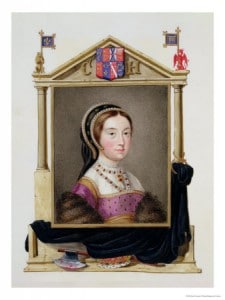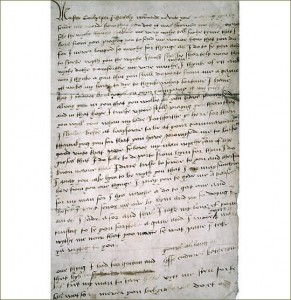 After abandoning the idea of interrogating the hysterical Queen Catherine Howard on 7th November, Archbishop Cranmer returned to the Queen’s apartments at Hampton Court Palace on 8th November 1541 to interrogate her.
After abandoning the idea of interrogating the hysterical Queen Catherine Howard on 7th November, Archbishop Cranmer returned to the Queen’s apartments at Hampton Court Palace on 8th November 1541 to interrogate her.
Cranmer reported to Henry VIII that he had intended to question her severely, “first, to exaggerate the grievousness of her demerits; then to declare unto her the justice of your grace’s laws, and what she ought to suffer by the same”, but that she was in such a state that “the recital of your grace’s laws, with the aggravation of her offences, might peradventure have driven her unto some dangerous ecstasy, and else into a very frenzy.” He therefore changed tactics and treated her more gently.
Cranmer reported that after Catherine had recovered from a sobbing fit, she told him:
“Alas, my lord, that I am alive! the fear of death grieved me not so much before, as doth now the remembrance of the king s goodness: for when I remember how gracious and loving a prince I had, I cannot but sorrow; but this sudden mercy, and more than I could have looked for, shewed unto me, so unworthy, at this time, maketh mine offences to appear before mine eyes much more heinous than they did before: and the more I consider the greatness of his mercy, the more I do sorrow in my heart that I should so misorder myself against his majesty.”
She went on to make a written confession, a copy of which can be found in Volume IV of The History of the Reformation of the Church of England by Gilbert Burnet – click here to read it. Here is a snippet concerning Francis Dereham:
“Examined whether I called him Husband, and he me Wife.— I do Answer, that there was Communication in the House that we Two should Marry together; and some of his Enemies had Envy thereat, wherefore he desired me to give him Leave to call me Wife, and that I would call him Husband. And I said I was content. And so after that, commonly he called me VVife, and many times I called him Husband. And he used many Times to Kiss me, and so he did to many other commonly in the House… As for Carnall Knowledge, I confess as I did before, that diverse Times he hath lyen with me, sometimes in his Doublet and Hose, and Two or Thre Times naked: But not so naked that he bad nothing upon him, for he had al wayes at the least his Doublet, and as I do think, his Hose also, but I mean naked when his Hose were putt down. And diverse Times he would bring Wine, Strawberryes, Apples, and other Things to make good Chear, after my lady was gone to Bed.”
At the end of this confession, she also mentioned Culpeper:
“As for the Communication after his coming out of Ireland, is untrue. But as far as I remember, he then asked me, if I should be Married to Mr. Culpepper, for so he said he heard reported. Then I made Answer, What should you trouble me therewith, for you know I will not have you ; and if you heard such Report, you heard more than I do know.”
Catherine also wrote a letter of confession to her husband the King which can be read in The Calendar of the Manuscripts of the Marquis of Bath Preserved at Longleat, Wiltshire, Volume II on pages 8 and 9 – click here:
“I your grace’s most sorrowful subject and most vyle wretche in the world not worthy to make any recomendacions unto your moste excellent majestye do oonely make my most humble submyssion and confession of my fawtz. And where no
cawse of mercye is gyven uppon my partie yet of your most accustomed mercy extended unto all other men undeserved most
humbly of my haundes and kneez do desire oon sparcle therof to be extended unto me although of all other creaturez most unwourthy eyther to be called your wyfe or subject. My sorowe I can by no wrytyng expresse neverthelesse I trust your most benygn nature will have some respect unto my youthe my ignorans my fraylnez my humble confession of my fawte and playne declaracion of the same referryng me holly mito your graces pitie and mercy. Fyrste at the flateryng and feire perswacions of Mannoke beyng bat a yong gyrle sufFred hym at soundry tymez to handle and towche the secrett partz of my body whiche neyther became me with honesty to permytt nor hym to requyre. Also Frauncez Derame by many persuasions procured me to his vicious purpose and obteyned first to lye uppon my bedde with his doblett and hose and after within the bedde and fynally he lay with me nakyd and used me in suche sorte as a man doith his wyfe many and sondry tymez but howe often I knowe not and our, company ended almost a yere before the Kynges majestye was maried to my lady Anne of Cleve and contynued not past oon quarter of a yere or litle above. Nowe the holl trouythe beyng declared unto your majestye I most humble beseche the same to considre the subtyll persuasions of young men and the ignorans and fraylnez of young women. I was so desierous to be taken unto your gracez favor and so blynded with the desier of wordly glorie that I cowde not nor had grace to considre how grett a fawte it was to conceyle my former fawtz from your majestic consideryng that I entended ever duryng my lyfe to be feithful and true unto your majestie after, and neverthlesse the sorowe of my oflensez was ever before myn eyez consideryng the infynyte goodnez of your majestye towardes me from tyme to tyme ever encressyng and not dymynysshyng. Nowe I referre the judgement of all myn offensez with my lyff and dethe holly unto your most benygne and mercjrfull grace to be considered by no justice of your majestiez lawez but onely by your infynyte goodnez pytie compassion and mercye without the whiche I knowledge myseliff worthy of most extreme punnysshement. —
Kateryn Howard”
Tip: Read it aloud and you’ll understand the old English.
 A letter allegedly written by Catherine to Thomas Culpeper was used as evidence against them. You can see the letter in the picture and it is an interesting letter. Marilyn Roberts and Conor Byrne pointed out that it’s almost as if it’s written in two different hands, so we cannot be sure that it was not faked. Marilyn, who had done extensive research on the Howard family, commented:
A letter allegedly written by Catherine to Thomas Culpeper was used as evidence against them. You can see the letter in the picture and it is an interesting letter. Marilyn Roberts and Conor Byrne pointed out that it’s almost as if it’s written in two different hands, so we cannot be sure that it was not faked. Marilyn, who had done extensive research on the Howard family, commented:
“Katherine Howard’s letter is open to different interpretations and has been seen as she being so anxious to see Culpeper because she was afraid he was talking about her outside court, or that he had implied he was going to make trouble for her. Personally I don’t think so, as making trouble for her would surely have been risking his own neck as well. I wonder if she actually wrote it at all – it was very conveniently found when his house was searched…
I have always had reservations about the letter: as Conor says, it appears to be in two different hands, and without other examples of Katherine’s writing, how can we be sure it wasn’t a fake planted amongst Culpeper’s things? Again, when you actually read it, it’s a funny sort of love letter and, bearing in mind the flowery language of the times, I think we need to be careful. (One of my favourites is the letter from Katherine’s great-grandfather John Howard, Duke of Norfolk to John Paston just before Bosworth asking him to get some fighting men organised, when he signs off ‘Yower lover John Norffolk’. It’s the equivalent of ‘friend fighting on the same side’, but no doubt it will only be a matter of time before some bright spark comes up with the claim that the two were a gay couple!”
So, perhaps Catherine never wrote it or perhaps it has been twisted. We will never know.
You can see a larger image of the letter on The National Archives website, see https://www.nationalarchives.gov.uk/
Also on this day in history…
- 1528 – Henry VIII made a public oration to “the nobility, judges and councillors and divers other persons” at Bridewell Palace to explain his troubled conscience regarding the lawfulness of his marriage to Catherine of Aragon. In this speech, the King explained that due to his worry that Mary was not his lawful daughter and that Catherine was not his lawful wife he had sent for a legate “to know the truth and to settle my conscience.” He went on to say “if it be adiudged by the law of God that she is my lawfull wife, there was neuer thyng more pleasaunt nor more acceptable to me in my lifebothe for the discharge & cleryng of my conscience & also for the good qualities and condicions the which I know to be in her” and “if I were to mary againe if the mariage might be good I would surely chose her aboue all other women”.
- 1543 – Birth of Lettice Knollys, daughter of Sir Francis Knollys and Catherine Carey, granddaughter of Mary Boleyn, and wife of Walter Devereux, 1st Earl of Essex; Robert Dudley, 1st Earl of Leicester; and Sir Christopher Blount. Lettice was also mother to Robert Devereux, 2nd Earl of Essex; Penelope Rich, Lady Rich; and Dorothy Percy, Countess of Northumberland.
Notes and Sources
- The History of the Reformation of the Church of England, Volume IV, by Gilbert Burnet, p505
- The Calendar of the Manuscripts of the Marquis of Bath Preserved at Longleat, Wiltshire Volume II, p8-9
- Comments made by Marilyn Roberts on The Anne Boleyn Files website
- Image of letter from Wikimedia Commons
- Hall’s Chronicle, p754-755, Henry VIII’s speech on 8th November 1528